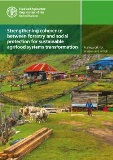FAO seeks to strengthen synergies between social protection and forestry
At the Committee on Forestry and World Forest Week, social protection emerged as an innovative solution for enhancing resilience and livelihoods.

Rome - Integrating social protection with sustainable forestry is vital for enhancing the resilience and livelihoods of forest-dependent communities while contributing to broader environmental sustainability and economic development goals, said Zhimin Wu, Director of the Forestry Division at the Food and Agriculture Organization of the United Nations (FAO), during the 9th World Forest Week.
Forests support the livelihoods of nearly one-third of the world's population, with roughly 40% of the rural poor in developing regions living in or near forested areas. However, these communities often face poverty, vulnerabilities, and food insecurity due to several environmental, economic, social, and political factors, further exacerbated by ecological degradation and climate change.
Wu addressed these issues at a side event focused on promoting forest-based food security and poverty reduction.
Building on a recent FAO publication, Qiang Ma, FAO Forestry Officer, highlighted the importance of strengthening coherence between social protection and forestry, particularly through forest and landscape restoration and value chain development.
Insights from China, Ghana, Kenya, Nepal, Tanzania, and showed that governments and forest and farm producer organizations are crucial in implementing these strategies and empowering forest-dependent populations.
In his closing remarks, Thomas Hofer, FAO Senior Forestry Officer, emphasized the need for comprehensive policies that support forest-dependent communities through social protection measures, market access, and sustainable resource management.
He also noted the significance of local governments and communities, strategic planning, and gender equality.
Forests as major source of food
The World Forest Week was held alongside the 27th session of the Committee on Forestry (COFO 27) at FAO´s headquarters in Rome from 22 to 26 July.
COFO, FAO’s top forestry governing body, is responsible for identifying emerging policy and technical issues, seeking solutions, and advising on appropriate action. This year, discussions focused on forests and innovation.
During the COFO week, the State of the World’s Forests 2024 (SOFO 2024) was released. This edition features innovation such as digital registries to improve access to social protection and formalized employment.
In Kenya, the Forest and Farm Facility helped integrate information from 450 impoverished charcoal producers into the Enhanced Single Registry by the National Social Protection Secretariat. This enabled these producers to receive a monthly USD 30 cash transfer per family.
China's "ecological forest ranger" policy provides job opportunities and social protection for poor farmers, complemented by training and skills development. These rangers patrol at-risk forests, report on forest disasters, and prevent potential damage to forest resources.
The Committee on Forestry also endorsed FAO Forestry Roadmap. This guiding document reaffirms that forest foods are important for the food security and nutrition of communities living near forests, especially in remote areas and during times of agricultural decline, such as droughts. It encourages countries to strengthen equitable access to resources by enhancing social protection, among other actions.

